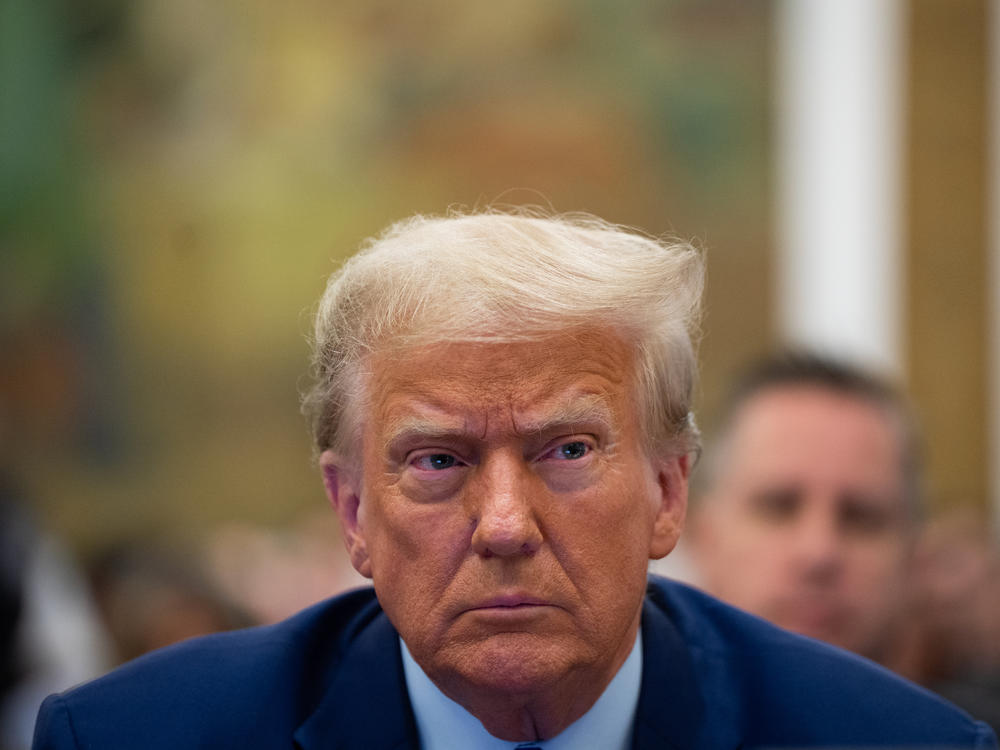Section Branding
Header Content
Siding with Trump, the ACLU says a judge's gag order in Jan. 6 case is too sweeping
Primary Content
The American Civil Liberties Union sued former President Donald Trump or his administration more than 400 times during his tenure in the White House.
But now the ACLU is siding with Trump in the criminal case that charges he conspired to disrupt the peaceful transfer of power — telling a judge that a gag order she's imposed sweeps too broadly in restraining Trump's speech.
"[I]f we allow his free speech rights to be abridged, we know that other unpopular voices — even ones we agree with — will also be silenced," said Anthony D. Romero, executive director of the ACLU. "As much as we disagreed with Donald Trump's policies, everyone is entitled to the same First Amendment protection against gag orders that are too broad and too vague."
Earlier this month, U.S. District Judge Tanya Chutkan imposed a limited gag order on Trump, barring him from making inflammatory remarks about special counsel Jack Smith and his team, court employees and likely witnesses in the federal election interference case against him in Washington, D.C.
"Undisputed testimony cited by the government demonstrates that when Defendant has publicly attacked individuals, including on matters related to this case, those individuals are consequently threatened and harassed," the judge wrote.
But in a friend-of-the-court brief filed Wednesday, the ACLU said voters have a right to hear what Trump has to say, especially as he runs to return to the White House in 2024. The civil liberties group said it's not convinced the judge's order is essential to protect the administration of justice.
ACLU attorneys Brett Max Kaufman, Ben Wizner and Brian Hauss wrote that restrictions that seek to stop Trump from "targeting" prosecutors and witnesses are vague because it's not clear what "targeting" might mean.
"In the context of the order, it could mean something as innocuous as 'name' or 'identify,' or something much more violent," they wrote. "One could target another with respectful but vigorous political advocacy, or target them for
physical violence or death."
Limiting Trump's remarks about the work of special counsel Smith and his prosecutors risks undermining a vigorous debate about how public officials are doing their jobs, the ACLU wrote. The lawyers urged the court to "exempt public officials from the coverage of its order, except to the extent that it bars speech that threatens or instigates violence against, such persons."
The ACLU team acknowledged a "serious risk" that Trump could inspire his political supporters to violence. But their court filing said the First Amendment doesn't give the judge license to gag him.
"The mere fact that others have threatened actions against trial participants after hearing Defendant's words is not enough," the ACLU said.
At a court hearing earlier this month, prosecutor Molly Gaston reminded Judge Chutkan that a Texas woman had been arrested for issuing violent threats against the judge. Trump also has been fined $5,000 in a civil fraud case in New York for failing to remove a baseless post attacking a judge's law clerk from his campaign website.
Trump lawyers John Lauro and Todd Blanche call the gag order in D.C. an "unconstitutional prior restraint" and have launched an appeal, which could help to delay the trial scheduled for March 2024. The judge has issued a temporary pause on the gag order while she awaits additional legal filings.
Copyright 2023 NPR. To see more, visit https://www.npr.org.

